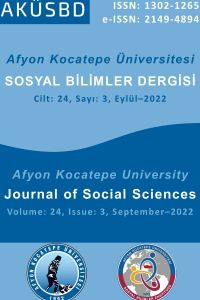Öz
Anahtar Kelimeler
Smart city descriptive survey method bibliography graduate theses
Kaynakça
- Aina, Y. A. (2017). Achieving smart sustainable cities with GeoICT support: The Saudi evolving smart cities. Cities, 71, 49-58. doi: /10.1016/j.cities.2017.07.007
- Al Sharif, R., & Pokharel, S. (2021). Smart City Dimensions and Associated Risks: Review of literature. Sustainable Cities and Society, 103542.
- Allen, B., Tamindael, L. E., Bickerton, S. H., & Cho, W. (2020). Does citizen coproduction lead to better urban services in smart cities projects? An empirical study on e-participation in a mobile big data platform. Government Information Quarterly, 37(1), doi: 101412. 10.1016/j.giq.2019.101412
- Caragliu, A., Del Bo, C., & Nijkamp, P. (2011). Smart cities in Europe. Journal of urban technology, 18(2), 65-82. doi: 10.1080/10630732.2011.601117.
- Dünya Bankası. (2010). Cities and Climate Change: An Urgent Agenda. Urban development series, Washington, DC.
- Erdoğan, O. (2020). Akıllı kent üzerine yazılan lisansüstü tezlerin içerik analizi. Atatürk Üniversitesi Sosyal Bilimler Enstitüsü Dergisi, 24 (2), 917-937.
- Guzzo, R. A., Jackson, S. E., & Katzell, R. A. (1987). Meta-analysis analysis. Research in organizational behavior, 9(1), 407-442.
- Gül, H., & Kemeç, A. (2020). nesnelerin interneti ve kamu politikaları: kentsel politika uygulamaları. C. Babaoğlu ve M. Yıldız (Ed) Teknoloji ve Kamu Politikaları içinde (ss. 139-167). Ankara: Gazi Kitabevi.
- Kemeç, A. (2021). Akıllı Kent Uygulamaları: Antalya Büyükşehir Belediyesi Örneği, (Doktora tezi), Süleyman Demirel Üniversitesi, Isparta.
- Kim, J. (2022). Smart city trends: A focus on 5 countries and 15 companies. Cities, 123, 103551.
- King, W. R., & He, J. (2005). Understanding the role and methods of meta-analysis in IS research. Communications of the Association for Information Systems, 16, 665-686. doi: 10.17705/1CAIS.01632
- Kumar, N. M., Goel, S., & Mallick, P. K. (2018). Smart cities in India: Features, policies, current status, and challenges. In 2018 Technologies for Smart-City Energy Security and Power (ICSESP) (1-4). IEEE. doi: 10.1109/ICSESP.2018.8376669
- Lim, C., Cho, G. H., & Kim, J. (2021). Understanding the linkages of smart-city technologies and applications: Key lessons from a text mining approach and a call for future research. Technological Forecasting and Social Change, 170, 120893. doi: 10.1016/j.techfore.2021.120893
- Marsal-Llacuna, M. L. (2020). The people's smart city dashboard (PSCD): Delivering on community-led governance with blockchain. Technological Forecasting and Social Change, 158, 120150.doi: 10.1016/j.techfore.2020.120150
- Osman, A. M. S. (2019). A novel big data analytics framework for smart cities. Future Generation Computer Systems, 91, 620-633.doi: 10.1016/j.future.2018.06.046
- Rani, S., & Kumar, R. (2022). Bibliometric review of actuators: Key automation technology in a smart city framework. Materials Today: Proceedings.
- Sadioğlu, U. &, Dinç, B. (2019). Yaşam boyu öğrenme ve akıllı kentler. Kamu Yönetimi ve Teknoloji Dergisi, 1(1), 63-88.
- Vince, C., & Morrissey, J. (2020). 5 focal points needed to develop a smart city. https://www.smartcitiesdive.com/news/5-focal-points-needed-to-develop-a-smart-city/580023/ (Erişim tarihi: 14.11.2021).
Öz
Anahtar Kelimeler
Akıllı kent betimsel tarama yöntemi bibliyografya lisansüstü tezler
Kaynakça
- Aina, Y. A. (2017). Achieving smart sustainable cities with GeoICT support: The Saudi evolving smart cities. Cities, 71, 49-58. doi: /10.1016/j.cities.2017.07.007
- Al Sharif, R., & Pokharel, S. (2021). Smart City Dimensions and Associated Risks: Review of literature. Sustainable Cities and Society, 103542.
- Allen, B., Tamindael, L. E., Bickerton, S. H., & Cho, W. (2020). Does citizen coproduction lead to better urban services in smart cities projects? An empirical study on e-participation in a mobile big data platform. Government Information Quarterly, 37(1), doi: 101412. 10.1016/j.giq.2019.101412
- Caragliu, A., Del Bo, C., & Nijkamp, P. (2011). Smart cities in Europe. Journal of urban technology, 18(2), 65-82. doi: 10.1080/10630732.2011.601117.
- Dünya Bankası. (2010). Cities and Climate Change: An Urgent Agenda. Urban development series, Washington, DC.
- Erdoğan, O. (2020). Akıllı kent üzerine yazılan lisansüstü tezlerin içerik analizi. Atatürk Üniversitesi Sosyal Bilimler Enstitüsü Dergisi, 24 (2), 917-937.
- Guzzo, R. A., Jackson, S. E., & Katzell, R. A. (1987). Meta-analysis analysis. Research in organizational behavior, 9(1), 407-442.
- Gül, H., & Kemeç, A. (2020). nesnelerin interneti ve kamu politikaları: kentsel politika uygulamaları. C. Babaoğlu ve M. Yıldız (Ed) Teknoloji ve Kamu Politikaları içinde (ss. 139-167). Ankara: Gazi Kitabevi.
- Kemeç, A. (2021). Akıllı Kent Uygulamaları: Antalya Büyükşehir Belediyesi Örneği, (Doktora tezi), Süleyman Demirel Üniversitesi, Isparta.
- Kim, J. (2022). Smart city trends: A focus on 5 countries and 15 companies. Cities, 123, 103551.
- King, W. R., & He, J. (2005). Understanding the role and methods of meta-analysis in IS research. Communications of the Association for Information Systems, 16, 665-686. doi: 10.17705/1CAIS.01632
- Kumar, N. M., Goel, S., & Mallick, P. K. (2018). Smart cities in India: Features, policies, current status, and challenges. In 2018 Technologies for Smart-City Energy Security and Power (ICSESP) (1-4). IEEE. doi: 10.1109/ICSESP.2018.8376669
- Lim, C., Cho, G. H., & Kim, J. (2021). Understanding the linkages of smart-city technologies and applications: Key lessons from a text mining approach and a call for future research. Technological Forecasting and Social Change, 170, 120893. doi: 10.1016/j.techfore.2021.120893
- Marsal-Llacuna, M. L. (2020). The people's smart city dashboard (PSCD): Delivering on community-led governance with blockchain. Technological Forecasting and Social Change, 158, 120150.doi: 10.1016/j.techfore.2020.120150
- Osman, A. M. S. (2019). A novel big data analytics framework for smart cities. Future Generation Computer Systems, 91, 620-633.doi: 10.1016/j.future.2018.06.046
- Rani, S., & Kumar, R. (2022). Bibliometric review of actuators: Key automation technology in a smart city framework. Materials Today: Proceedings.
- Sadioğlu, U. &, Dinç, B. (2019). Yaşam boyu öğrenme ve akıllı kentler. Kamu Yönetimi ve Teknoloji Dergisi, 1(1), 63-88.
- Vince, C., & Morrissey, J. (2020). 5 focal points needed to develop a smart city. https://www.smartcitiesdive.com/news/5-focal-points-needed-to-develop-a-smart-city/580023/ (Erişim tarihi: 14.11.2021).
Ayrıntılar
| Birincil Dil | Türkçe |
|---|---|
| Bölüm | İktisadi ve İdari Bilimler |
| Yazarlar | |
| Yayımlanma Tarihi | 26 Eylül 2022 |
| Gönderilme Tarihi | 8 Aralık 2021 |
| Yayımlandığı Sayı | Yıl 2022 Cilt: 24 Sayı: 3 |

This work is licensed under a Creative Commons Attribution-NonCommercial-NoDerivatives 4.0 International License.

